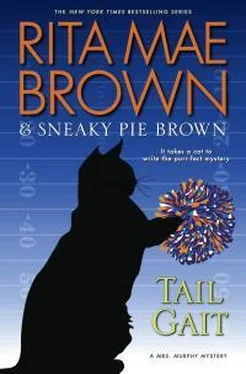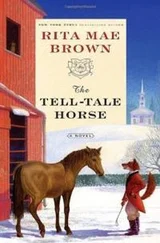“That’s fine.”
—
Harry reached the house in Ednam Forest in twenty-five minutes. In the driveway, she stepped out of her truck and into the backseat of Susan’s Audi station wagon. Olivia sat in the front seat.
As Susan backed out, Harry reached forward, putting her hand on Olivia’s shoulder. Olivia covered Harry’s hand with her own.
The women talked in the car as Susan drove all the way to Sugar Hollow.
“I set him off,” Olivia cried. “I never imagined he would recognize me.”
“You’ve changed very little,” Susan remarked, observing from the road here that this part of Albemarle County was about one week behind the rest with its spring flowers and such.
“How did you find out, Olivia?” asked Harry.
“Sheriff Shaw.”
“What!” Both Harry and Susan exclaimed.
Olivia stared straight ahead, but didn’t seem to see the road. “When Frank was picked up on the mall after a nine-one-one call, he was writhing, retching, screaming in pain. So the ambulance driver obviously took him immediately to UVA Hospital, which is close by. They stabilized him, washed him, cleaned him up, and put him in a room by himself. He was unconscious by then, plus the doctor had given him something to calm him down.”
“Poor devil!” Susan exclaimed, checking in the rearview mirror to see Harry’s expression.
Olivia composed herself. “Well, when he became conscious, he asked for the sheriff. Sheriff Shaw and Deputy Cooper came to the hospital. Frank confessed to killing Daddy.”
“What!” Both Harry and Susan exclaimed again in unison. They were a regular Greek chorus.
“Frank said he shot Daddy with a .45.”
Harry’s keen mind was like a blade being sharpened. “Frank yelled on the mall that he wished he’d killed your father. Now he says he did.”
“Yes, I told the sheriff that, too.”
“And?” Harry’s voice lifted.
Olivia turned all the way around in the seat and looked Harry in the eye. “He pointed out that Daddy was killed by a .45. But Frank says he walked up, faced him at a distance, called out his name, and shot him. Obviously, he didn’t. Brinsley Sims said no one was on the fairway when Dad was shot.” Brinsley Sims, a longtime friend of Ginger’s, had been playing golf with him that horrible day.
“I’ve read where people confess to crimes they haven’t committed,” Susan thoughtfully mentioned as she slowed for a curve on the old gravel two-lane road.
Olivia’s tears slowed. “Why? To save someone else?”
“That, or for attention,” and Susan. “And then there are always those who are crazy, flat-out crazy,” she added.
“Frank would seem to fit the bill,” Olivia softly replied.
“Being a drunk makes someone deceitful, shrewd even, but not necessarily crazy,” Harry said.
“Alcohol kills brain cells. Sooner or later, the mind unravels.” Olivia stared out the window. “Frank had a good mind. He remembered all those complicated football plays. How he could run, how he could run and fly through tackles as though they weren’t there.” She sighed at the memory. “And he was a good history student. Daddy liked him until we started dating.”
“Somehow, seeing someone with a good mind, with athletic talent, ruin themselves with alcohol, it seems worse than if they were average.” Susan pulled to the side of the road.
“Doesn’t mean he wouldn’t have become a drunk. Think of all the brilliant people who destroy themselves and everyone around them by drinking,” Harry replied.
A flash of humor enlivened Olivia. “Harry, you sound like Carrie Nation!”
“I’ll bring my hatchet next time.” Harry was glad to see Olivia bouncing back just a touch. “She wasn’t really wrong, but Prohibition was. You can’t legislate human behavior. Murder. Right! The Ten Commandments: ‘Thou Shalt Not Steal,’ but we’ve been fleecing one another for thousands of years. And how does one circumvent ‘Thou Shalt Not Kill’?”
“Nations always come up with a reason. Daddy used to say there are times when the only answer is war. Without that, some problems will never be settled.”
Harry’s curiosity rose up. “Did he mention murder?”
“Funny you ask that, because I was trying to remember if he talked about that, and I don’t think he did. Oh, if there was something in the news, he would discuss it, but other than something like that, no. Dad concentrated on the grand sweep of history, on the lives of our ancestors. Sometimes he might talk about the crime rate, such as after the Revolutionary War.”
Susan turned around to head back toward town. “There is a difference between murder and war. At least I think there is.”
“Volume, for one thing.” Harry tossed that off.
“There is that,” Olivia agreed.
“For whatever reason, Frank’s confession is peculiar,” said Susan. “Peculiar, unbelievable, some weird fantasy.”
Harry turned sideways to put her right leg up on the rear seat. “Did Sheriff Shaw say how Frank tried to kill himself?”
“Rat poison, but he didn’t take enough. He also said that all that retching only brought up alcohol. Frank hadn’t eaten for days, and that seems not to have been unusual.”
“Forgive me for asking this, but it could be important.” Harry leaned forward. “Did you ever sleep with Frank?”
“Oh, my God, no! Not back then. I mean, if I had, and Daddy had found out, he would have killed Frank.” Harry looked into the rearview mirror and saw Susan looking back at her.
Harry changed the subject. “Ginger, as always, was hard at work on something. He said that he was returning to the Revolutionary War and immediately after. He also said that he had to have lived this long to ask the right questions.”
Olivia smiled, remembering her father’s enthusiasm. It was like a kid’s. “Oh, Daddy would say to me when we talked on the phone, ‘Before now, I never wondered how those who secretly thought we were wrong to separate from England accepted the new order. The really passionate ones fled to Canada or returned to England.’ ”
Harry knew something about early history. “It is interesting, but apart from the Whiskey Rebellion, people did accept the new ways. Trying to figure out how to run a new country, how to make money, no doubt took up everyone’s time,” she mused.
“Your father really was enthusiastic,” said Susan. “He bubbled over. When I was in school, they’d focus on the wars only, and you had to memorize the dates. But the periods leading up to war and then their aftermath are critical. If you don’t get it right, boom!, another war, or at least some form of collapse.” Susan smiled. “That’s what Ned says. He’s the reader, not me.”
“Maybe we all need to go back and read about that time,” Harry suggested, although she couldn’t understand what had set off Ginger’s killer. Sometimes, nearly anything sets off a new idea or radical course of action.

April 17, 2015
Nelson Yarbrough, Marshall Reese, Paul Huber, and Rudy Putnam sat in Frank’s hospital room.
When the admitting doctor had asked Frank his next of kin, he had given Nelson Yarbrough’s name. Despite being no relation, Frank put Nelson’s name down, as he’d always looked up to the quarterback. As a kid, he had worshipped him. Nelson, shocked to receive the call from the hospital physician, called the alumni in town. With the exception of Willis Fugate, who was in D.C. that day, they all showed up at the hospital in support—of Nelson Yarbrough rather than Frank Cresey.
Gasping for breath, hooked up to an IV, Frank couldn’t believe his bloodshot eyes as he looked at this gathering of football players: his childhood heroes, all of whom had tried to help him over the years. “Will you all bury me?”
Читать дальше













